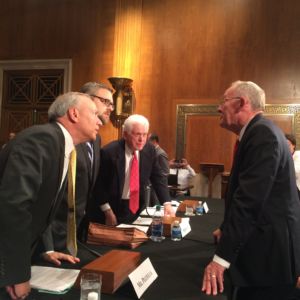President Donald Trump took a major step towards implementing his workplace agenda Thursday with his labor board nominees getting a confirmation hearing.
The National Labor Relations Board (NLRB) consists of five members that oversee labor dispute cases. Critics have expressed concern that the board has become overly political during the last administration. Trump has two pending nominations that could cause the board to change course.
Marvin Kaplan was nominated to fill one of the two vacant seats June 19. William Emanuel was later nominated June 27 to fill the remaining empty seat. Philip Miscimarra has already begun serving as the chairman of the board. He was previously a member and served as the acting chairman.
“Today’s hearing is important for our nation and our workers,” Sen. Lamar Alexander, the chairman of the Senate Health, Education, Labor and Pensions (HELP) committee, said during the hearing. “We need a full board, I’m not the only one who thinks that.”
The HELP committee held the hearing to determine whether the nominees should be approved. Republicans primarily focused on the importance of having a full board that is nonpartisan. Republicans have denounced the board for becoming overly political during the past administration.
“My hope is these nominees will bring balance back to the board,” Alexander said. “When the board is partisan it creates instability in the workplace.”
Ranking Democrat Patty Murray instead decided to grill the nominees on whether they believe their mission is to uphold collective bargaining and protect unions. Emanuel responded the law does compel him to protect unions and collective bargaining. But he adds the law also requires him to protect employers, workers, and the public during labor disputes.
“Certainly that is one of the principal purposes of the National Labor Relations Act,” Emanuel said during the hearing. “There are other principals in that statute as well.”
Democratic Sen. Elizabeth Warren accused the nominees of showing a clear anti-unions bias in the past. Sen. Al Franken echoed those concerns. Kaplan responded to the concerns by stating he will review labor dispute cases in an impartial way according to the law.
Emanuel currently works as an employment lawyer in Los Angeles for the law firm Littler Mendelson. He has worked on cases involving union contract negotiations, strikes, and collective bargaining administration. Kaplan is currently the chief counsel of the Occupational Safety and Health Review Commission.
Former President Barack Obama oversaw the board at a time when it was making major changes to workplace rules. The NLRB was able to make the changes by updating how it rules on certain labor dispute cases. Critics saw the changes as a clear sign the board had failed its mission of being an impartial judicial body.
Chairman Alexander adds bias has been a problem in past administrations as well. Presidents can potentially influence the board politically by who they nominate to fill the majority of seats. Alexander and others have argued the bias went to new extremes during the last administration.
The HELP committee also questioned the current pick for deputy secretary of labor during the hearing. Patrick Pizzella was nominated to fill the position June 20. He currently serves as the acting chairman of the Federal Labor Relations Authority.
Trump has made working class issues a cornerstone of his agenda. The NLRB could prove to be a key component in implementing those ideas. The president has also managed to fill other key positions. Alexander Acosta was confirmed as the current secretary of labor April 27.
The business community has expressed hope the nominations will bring balance back to the agency. The International Franchise Association (IFA), the National Restaurant Association, and the National Retail Federation have all applauded the nominees.
“Franchise owners around the country are facing a great deal of regulatory uncertainty as a result of the wreckage created by the previous administration,” IFA President Robert Cresanti said June 28. “We urge the Senate to confirm both Kaplan and Emanuel quickly so the new labor board can address regulatory issues facing the franchise model as quickly as possible.”
The Obama administration argued the changes were designed to better protect workers. The NLRB focused on how union elections are held, how companies can contract together, and how contract workers are classified. The Department of Labor (DOL) tackled policy areas like overtime and federal contracting.
The Competitive Enterprise Institute noted in a coalition letter Jan. 30 the Labor Department alone imposed $55.7 billion in regulatory costs on employers during the last administration. It adds that during that time the gross domestic product only averaged less than two percent while an increased number of people dropped out of the labor market.

